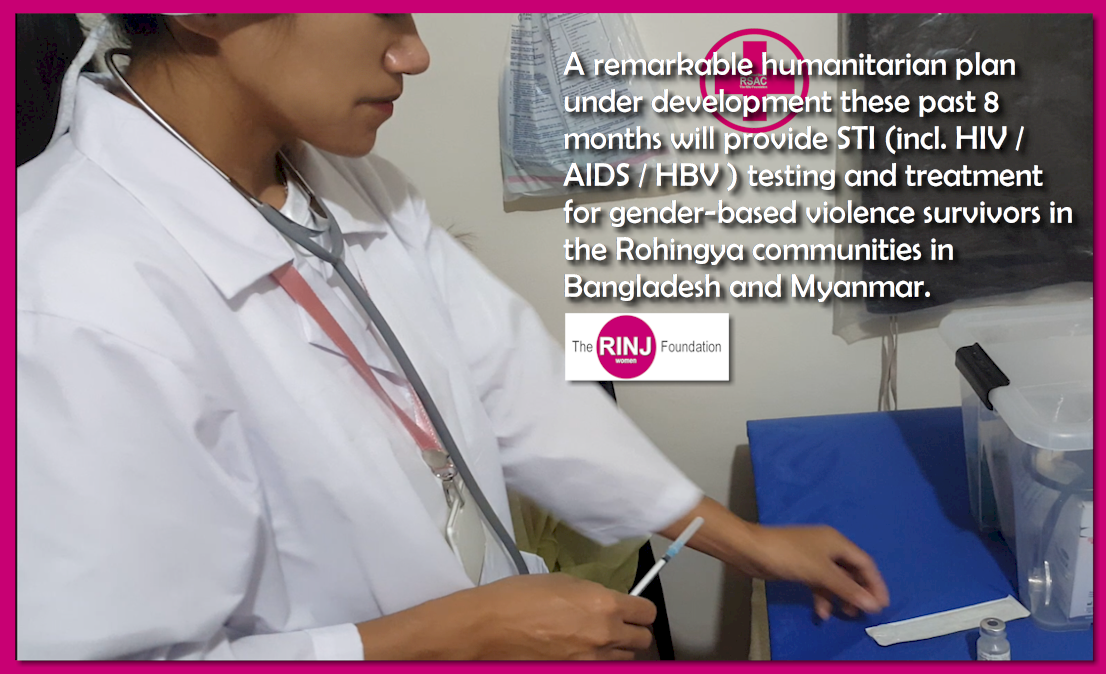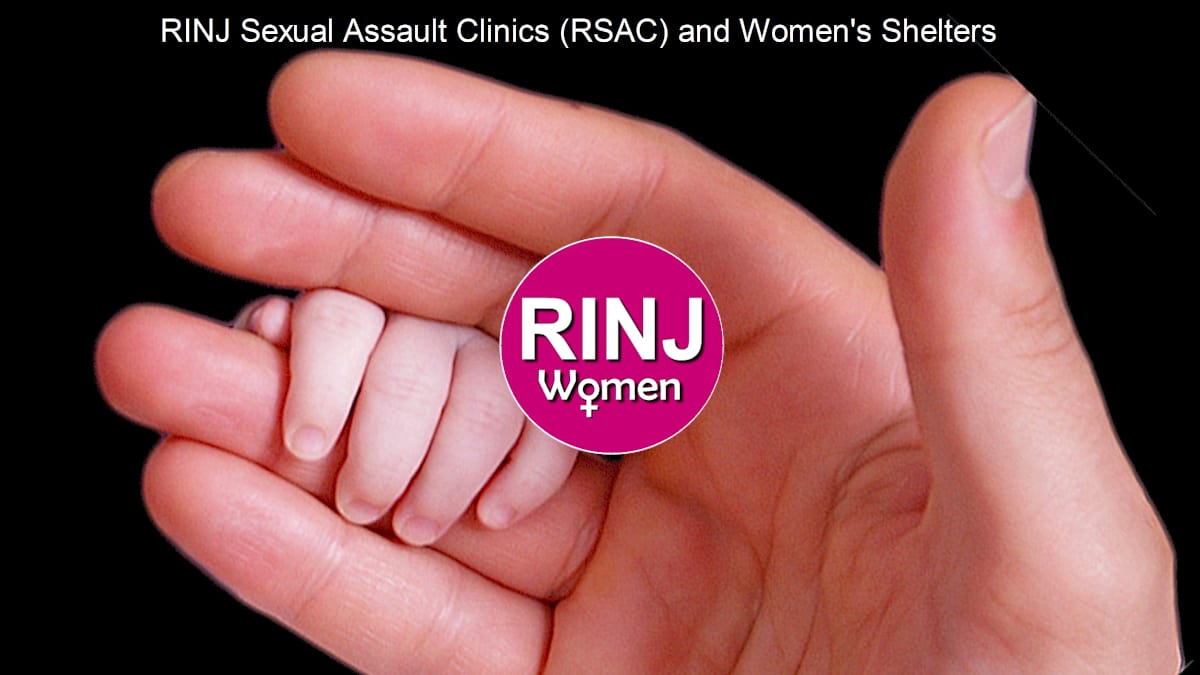 Mission: Provide STI (incl. HIV/AIDS/HBV) testing and treatment for gender-based violence survivors in the Rohingya community.
Mission: Provide STI (incl. HIV/AIDS/HBV) testing and treatment for gender-based violence survivors in the Rohingya community.
 Donate Using PayPal Donate Using PayPal |
Or use our fast secure credit card processing:
Other methods of donation include direct bank payment or Interac, Stripe and PayPal.
The Rohingya have been driven from Myanmar in large numbers in an act of ethnic cleansing by the Myanmar government. Initially some 700,000 fled Myanmar to Bangladesh around Bengal Bay. That number is now up to a million in three horrible improvised camps.
RINJ wants to support mothers and their infants in the camps and in Myanmar.
“This is a very difficult situation,” says RINJ, “because the governments of Myanmar and Bangladesh do not want to discuss rape, genocide, HIV and HBV, Monkeypox, even though the soldiers of Myanmar have spread disease among each other by raping the same females among an estimated 100,000 women and children.”

Gender-based Violence, HIV, AIDS, HBV, other STIs in a patchwork quilt from hell.
Photo Credit: UNICEF
Photo Art/Cropping/Enhancement: Rosa Yamamoto FPMag

Photo Credit: Violaine Martin / UN
Marzuki Darusman, Chair of the Independent International Fact-finding Mission on Myanmar (centre), flanked by Mission members Christopher Sidoti (l) and Radhika Coomaraswamy (r), briefs the press on their report, UN Office at Geneva, 27 August 2018.
This is a state-sponsored crime against humanity according to UN officials and the RINJ Foundation.

Photo Credit: UNHCR/Roger Arnold – Thousands of Rohingya refugee arrivals cross the border near Anzuman Para village, Palong Khali, Bangladesh. As an estimated 700,000 Rohingya first sought safety in Bangladesh between late-August and October 2017, UNHCR worked with the authorities to create a transit centre to prepare for a further influx, as some 11,000 people crossed the border on 9th October 2017. They crossed by land into south-eastern Bangladesh through several points. Many came from the Buthidaung area in Myanmar’s northern Rakhine state. Some said they fled torching and killings. Others said they left in fear ahead of anticipated violence. To reach Bangladesh, they walked for days, many carrying children. They waded through marshland before swimming across the Naf river that divides the two countries. UNHCR worked swiftly to accommodate as many as possible in the camps and settlements in Kutupalong and Balukhali, and provided emergency relief items. Today, two years later, the Rohingya are still on Bengal Bay in Bangladesh.
Top military commanders in Myanmar should be investigated and prosecuted for the “gravest” crimes against civilians under international law, including genocide, United Nations-appointed investigators said in late August 2018. That prosecution still has not happened.
RINJ has no aim to apportion blame, only to help the survivors and to end the epidemic.
The RINJ Foundation CEO has clearly indicated and undertaken that the RINJ organization is not going to seek or prosecute rapists in this matter and will not be collecting DNA or any evidence related to crime.
Deutsches Welle reports from the UN General Assembly: “In Bangladesh’s annual address to the UN General Assembly, Prime Minister Sheikh Hasina on Friday urged the international community to “understand the untenability of the situation” surrounding the Rohingya refugees from Myanmar, who are fleeing persecution by the military there.
“More than 700,000 Rohingya fled what has been called an ethnic cleansing campaign involving mass rapes, killings and the burning of thousands of their homes in 2017. They have been living in overcrowded makeshift camps in the Bangladeshi coastal city of Cox’s Bazar since then.
“While the Muslim-majority country has provided shelter to the refugees, very little has been done by the international community to repatriate them to Myanmar. Meanwhile, tensions have been growing between the refugees and local communities, as many Bangladeshi citizens fear the Rohingya might not ever return to the country they came from.”
The RINJ CEO said the organization fully supports the Bangladesh plan as follows:
- Myanmar must manifest clear political will supported by concrete actions for the sustainable return and reintegration of the Rohingya to Myanmar.
- Myanmar must build trust among the Rohingya by discarding discriminatory laws and practices and allowing “go and see” visits to northern Rakhine by Rohingya representatives.
- Myanmar must guarantee the security and safety of the Rohingya by deploying civilian monitors from the international community in Myanmar’s Rakhine state.
- The international community must ensure that the root causes of the Rohingya problem are addressed and the violation of human rights and atrocities committed against the Rohingya are accounted for.
“The sole goal is to test and treat survivors and help them repatriate back to their homes in good health and with all available haste,” says a statement from the “The Rohingya HIV/HBV project” coordinator.
The RINJ Foundation has worked with a number of universities and pharmaceuticals to fine tune testing procedures and has a global free testing plan. RINJ already has a unique approach to testing that works.
Global Sex Slavery
Up to 80,000 pregnancies resulted from the rape of the Rohingya women.
Of the hundreds of thousands of women and children in Bangladesh camps and those who remained in Myanmar, many are swept up into the global sex slavery world.
Sex slavery and child exploitation is going to increase the EPIDEMICS of HIV and HBV. Slavery must end and the diseases must be treated and their spread contained.
“RINJ Women have some idea of the extent of the problem and it is so bad, it will not be discussed for publication,” said Sharon Santiago.
“Better to just deal with solutions,” she added. “The Rohingya are in a desperate, premorbid condition. Solving problems that have stigma is more important than discussing these politically tainted notions that rank with bogey men and witches among some of the regional political leaders. These are medical problems that have medical solutions.”
The initial goal is to test 100,000+
“Project nurses will be hired from the Philippines and Bangladesh for the most part, led by expert doctors and nurses from other parts of the world,” says the project coordinator.
“Practical nurses will be paid on average $1,929.00 per month plus their expenses for travel will be paid. Their accommodation will be shared, and not very attractive in all honesty but the local environs on Bengal Bay are lovely.” The camps are not, she added.
“Nurses will live with the Rohingya survivors in Bangladesh and other arrangements will take place in Myanmar.
“Our bosses have stipulated that The RINJ Foundation will maintain its policies in this project hence will provide services for any person in Myanmar and that includes alleged rapists and the survivors. The goal is to test and treat any infected persons.”
- The methodology of HIV treatment involves the use of various blends of medications to suppress HIV to the point where the virus is undetectable in the bloodstream.
- At this point the patient is a candidate for certain new experimental drug tests wherein the medicine finds the virus where it is hidden and kills it.
- That’s the simple version, non-technical and optimistically stated. Some cases will be more challenging.
- Some day, HIV will kill nobody suggests doctors and scientists at a July 2019 World HIV conference in Mexico City. But this will take a lot of work.
Hepatitis B (HBV), with higher morbidity than HIV, has become hyper endemic in the Philippines where the project’s head office is based. More and more experience is being garnered in PH. As much as 17% of the adult population, nearly seven and a half million adult Filipinos, are infected with HBV, a disease that transmits sexually more often and more easily than HIV.
Challenges in Bangladesh and Myanmar where comorbid HIV/HBV is present must be treated. Better yet, HBV must be vaccinated.
No shame, no stigma. Just get treated and the virus will not spread.
The RINJ Foundation, a global civil society group said that for survivors of sexual exploitation there is no shame in testing positive. Persons who begin HIV treatment are almost certain of becoming non-contagious and living relatively normal lives.
“Rapists in Myanmar have created thousands of pregnancies among about 700,000 women. Many infants and mothers have died. We need to halt this,” said Santiago, firmly. “Treatment is the only aim.”
We know those rapists are testing positive for HIV and HBV. Their requests for discrete testing has yielded a class of people who have shared the viruses by forcibly raping women, hence opening blood passageways via lesions and lacerations, to fluid transfers and microbial invaders. It was the worst scenario. Now serious comorbid infections must be dealt with.
Many female survivors are willing to try new experimental vaccines and Gene mimicry therapies for routing out hidden HIV virus and killing it.
“While this one million group of people in Bangladesh and 700,000 group in Myanmar are getting little attention, it is the RINJ Foundation theory, that the crisis represents an opportunity to find a vaccine and a curative treatment for numerous strains of HIV. Unless HBV kills the patients first. Hence both must be treated,” says the RINJ coordinator who says she us relaying RINJ policy.
RINJ says the project will begin in late November 2019 if funding avenues have been obtained.
Santiago says that nurses can make job applications at RINJ.org/hr/ in any case because they will be needed on one or another projects regardless of the Rohingya project. Donations, she added, for the project, can be made at RINJ.org/donations.


